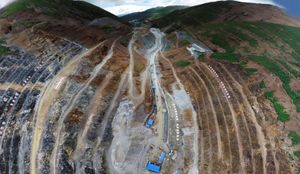President Donald Trump and Japan's Prime Minister Shigeru Ishiba met on February 7, 2023, at the White House to discuss the future of steel industry investments between their two nations. During this historic meeting, Trump revealed Japan's intention to significantly invest, rather than acquire, U.S. Steel, marking a pivotal moment for economic relations between the countries.
Trump, emphasizing the importance of the U.S. steel industry, stated, "We agreed to invest heavily, not to acquire, which is very significant to us." This announcement, made during their joint press conference, underscored the U.S. commitment to growing its domestic steel production and the positive impact of foreign investment.
Ishiba echoed Trump's sentiments, articulately noting, "This will create products benefiting both Japan and America, ensuring mutual gains." The discussions highlighted the two leaders' intent to fortify their nations' economic ties through strategic partnerships in the steel sector, benefiting both industries without leading to one-sided profits.
The backdrop of these discussions is notable, especially considering the heightened complexity of global supply chains and the necessity for countries to maintain secure and resilient manufacturing sectors. The partnership is particularly significant as economies around the world face challenges prompted by geopolitical tensions and pandemic-related disruptions.
During their meeting, Ishiba conveyed Japan's dedication to enhancing its defense capabilities, which aligns with Trump's commitment to security collaboration. The two leaders discussed strengthening the U.S.-Japan alliance, particularly concerning regional security dynamics and shared economic interests.
Both leaders reaffirmed their commitment to leveraging technology, including artificial intelligence and advanced materials, to spearhead innovation not only for their respective steel industries but also across manufacturing. These initiatives aim to bolster productivity and maintain competitiveness on the global stage.
Trump and Ishiba's discussions also touched on broader issues affecting the Indo-Pacific region, including security challenges posed by China. Trump's previous advocacy for mutual defense agreements and deterrence strategies was reiterated, underscoring the U.S.'s unwavering commitment to Japan's security.
The importance of Japan has only grown as it has emerged as the largest source of foreign direct investment in the United States over the last five consecutive years. Both leaders expressed interest in increasing Japan's investment to unprecedented levels, with aspirations of hitting the $1 trillion mark, which would solidify their partnership significantly.
Post-meeting, Trump's words welcomed Japan's proactive approach. He added, "Japan's investments will not only benefit the steel industry but also create jobs here, strengthening our economy collectively." This reflects Trump's broader strategy of prioritizing American jobs and industries amid intense competition from global oversees forces.
Japan's Nippon Steel sees the potential for enhanced production technologies to benefit not just Japan and the U.S. but also the global market, showcasing the depth of shared innovation.
Beneath the economic discussions lies the underlying acknowledgment of historical ties and partnerships cultivated over decades between the two nations. Throughout the meeting, both Trump and Ishiba referenced their predecessors, emphasizing the continuity and evolution of the U.S.-Japan partnership.
Looking toward the horizon, the sentiment from both leaders is of optimism and eagerness to correct the course of bilateral relations through trade, investment, and shared values. Trump hinted at future collaborations, drawing attention to Nippon Steel's planned meeting with U.S. Steel's management next week, aimed at hashing out the investment framework.
With these developments, it is clear the U.S. and Japan are steering their economic relationship toward new heights, signaling to the world the strength and resolve of their alliance. The planned investments present not only opportunities for both companies but also a renewed commitment to stability and growth within the Indo-Pacific region.
Through this mutual agreement, both nations affirm the significance of collaboration and innovation, showcasing how strategic investments can lead to substantial economic benefits and reflect their foundational security partnership.



